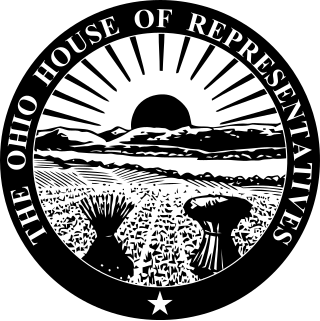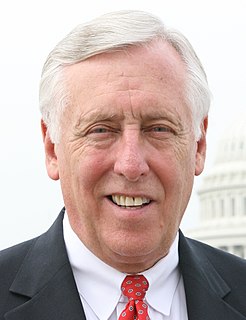Related Research Articles

The Senate Majority Leader and Minority Leader are two United States senators and members of the party leadership of the United States Senate. They serve as the chief Senate spokespersons for their respective political parties holding the majority and the minority in the United States Senate. They also manage and schedule the legislative and executive business of the Senate. They are each elected as Majority Leader and Minority Leader by the Senators of their party caucuses: the Senate Democratic Caucus and the Senate Republican Conference.

The Voting Rights Act of 1965 is a landmark piece of federal legislation in the United States that prohibits racial discrimination in voting. It was signed into law by U.S President Lyndon B. Johnson during the height of the civil rights movement on August 6, 1965, and Congress later amended the Act five times to expand its protections. Designed to enforce the voting rights guaranteed by the Fourteenth and Fifteenth Amendments to the United States Constitution, the Act secured the right to vote for racial minorities throughout the country, especially in the South. According to the U.S. Department of Justice, the Act is considered to be the most effective piece of federal civil rights legislation ever enacted in the country.

LGBT is an initialism that stands for lesbian, gay, bisexual, and transgender. In use since the 1990s, the term is an adaptation of the initialism LGB, which was used to replace the term gay in reference to the LGBT community beginning in the mid-to-late 1980s. Activists believed that the term gay community did not accurately represent all those to whom it referred.

Minority Report is a 2002 American science fiction action film directed by Steven Spielberg and loosely based on the 1956 short story "The Minority Report" by Philip K. Dick. It is set primarily in Washington, D.C., and Northern Virginia in the year 2054, where PreCrime, a specialized police department, apprehends criminals based on foreknowledge provided by psychics called "precogs". The cast includes Tom Cruise as Chief of PreCrime John Anderton, Colin Farrell as Department of Justice agent Danny Witwer, Samantha Morton as the senior precog Agatha, and Max von Sydow as Anderton's superior Lamar Burgess.
Ethnic minorities in China are the non-Han Chinese population in China. China officially recognizes 55 ethnic minority groups within China in addition to the Han majority. As of 2010, the combined population of officially recognized minority groups comprised 8.49% of the population of mainland China. In addition to these officially recognized ethnic minority groups, there are Chinese nationals who privately classify themselves as members of unrecognized ethnic groups.
A minority government, minority cabinet or minority parliament is a cabinet formed in a parliamentary system when a political party or coalition of parties does not have a majority of overall seats in the parliament. It is sworn into office, with or without the formal support of other parties, to enable a government to be formed. Under such a government, legislation can only be passed with the support of enough other members of the legislature to provide a majority, encouraging multi-partisanship. In bicameral parliaments, the term relates to the situation in the chamber whose confidence is considered most crucial to the continuance in office of the government.
A minority group, by its original definition, refers to a group of people whose practices, race, religion, ethnicity, or other characteristics are lesser in numbers than the main groups of those classifications. However in present-day sociology, a minority group refers to a category of people who experience relative disadvantage as compared to members of a dominant social group. Minority group membership is typically based on differences in observable characteristics or practices, such as: ethnicity, race, religion, sexual orientation, or disability. Utilizing the framework of intersectionality, it is important to recognize that an individual may simultaneously hold membership in multiple minority groups. Likewise, individuals may also be part of a minority group in regard to some characteristics, but part of a dominant group in regard to others.
A minority language is a language spoken by a minority of the population of a territory. Such people are termed linguistic minorities or language minorities. With a total number of 196 sovereign states recognized internationally and an estimated number of roughly 5,000 to 7,000 languages spoken worldwide, the vast majority of languages are minority languages in every country in which they are spoken. Some minority languages are simultaneously also official languages, such as Irish in Ireland or the numerous indigenous languages of Bolivia. Likewise, some national languages are often considered minority languages, insofar as they are the national language of a stateless nation.

The Ohio House of Representatives is the lower house of the Ohio General Assembly, the state legislature of the U.S. state of Ohio; the other house of the bicameral legislature being the Ohio Senate.
In political science, minoritarianism is a neologism for a political structure or process in which a minority segment of a population has a certain degree of primacy in that entity's decision making. Minoritarianism may be contrasted with majoritarianism, but with legislative power being held or controlled by a minority group rather than the majority.
A minority religion is a religion held by a minority of the population of a country, state, or region. Minority religions may be subject to stigma or discrimination. An example of a stigma is using the term cult with its extremely negative connotations for certain new religious movements. People who belong to a minority religion may be subject to discrimination and prejudice, especially when the religious differences correlate with ethnic differences.
In United States politics, a ranking member is the most senior member of a congressional or state legislative committee from the minority party. On many committees the ranking minority member, along with the chairman, serve as ex officio members of all of the committee's subcommittees.
In U.S. politics, the minority leader is the floor leader of the second largest caucus in a legislative body. Given the two-party nature of the U.S. system, the minority leader is almost inevitably either a Republican or a Democrat. The position could be considered similar to that of the Leader of the Opposition in parliamentary systems. In bicameral legislatures, the counterpart to the minority leader in the lower house is the Speaker, and the majority leader is hence only the second-most senior member of the majority caucus. Contrastingly, in upper houses, the titular Speaker is frequently a separately elected officer such as a lieutenant governor or vice president.
A visible minority is defined by the Government of Canada as "persons, other than aboriginal peoples, who are non-Caucasian in race or non-white in colour". The term is used primarily as a demographic category by Statistics Canada, in connection with that country's Employment Equity policies. The qualifier "visible" was chosen by the Canadian authorities as a way to single out newer immigrant minorities from both Aboriginal Canadians and other "older" minorities distinguishable by language and religion, which are "invisible" traits.
Minority rights are the normal individual rights as applied to members of racial, ethnic, class, religious, linguistic or gender and sexual minorities; and also the collective rights accorded to minority groups. Minority rights may also apply simply to individual rights of anyone who is not part of a particular majority.
The United Kingdom is composed of people of varying ethnicities. The largest ethnic group is White British and various other minority ethnic groups make up the rest. Ethnicity in the United Kingdom is formally recorded at a national level at each census. The 2011 United Kingdom census recorded a reduced share of White British people in the United Kingdom since the census preceding it in 2001. Contributing factors to growing populations of ethnic minorities are varied in nature, including differing birth rates and Immigration.
Russia is a multi-national state with over 185 ethnic groups designated as nationalities; the populations of these groups vary enormously, from millions to under 10,000.
The Ministry of Minority Affairs is a ministry of the Government of India which was carved out of Ministry of Social Justice and Empowerment and created on 29 January 2006. It is the apex body for the central government's regulatory and developmental programmes for the minority religious communities in India, which include Muslims, Sikhs, Christians, Buddhists, Zoroastrians (Parsis) and Jains notified as minority communities in The Gazette of India under Section 2(c) of the National Commission for Minorities Act, 1992.
Filibuster is a tactic used in the United States Senate to prevent a measure from being brought to a vote by means of obstruction. The most common form occurs when one or more senators attempt to delay or block a vote on a bill by extending debate on the measure. The Senate rules permit a senator, or a series of senators, to speak for as long as they wish, and on any topic they choose, unless "three-fifths of the Senators duly chosen and sworn" vote to bring the debate to a close by invoking cloture under Senate Rule XXII.

Party leaders and whips of the United States House of Representatives, also known as floor leaders, are elected by their respective parties in a closed-door caucus by secret ballot. With the Democrats holding a majority of seats and the Republicans holding a minority, the current leaders are: Majority Leader Steny Hoyer, Majority Whip Jim Clyburn, Minority Leader Kevin McCarthy and Minority Whip Steve Scalise.
References
| This article about a Sudanese ethnicity is a stub. You can help Wikipedia by expanding it. |